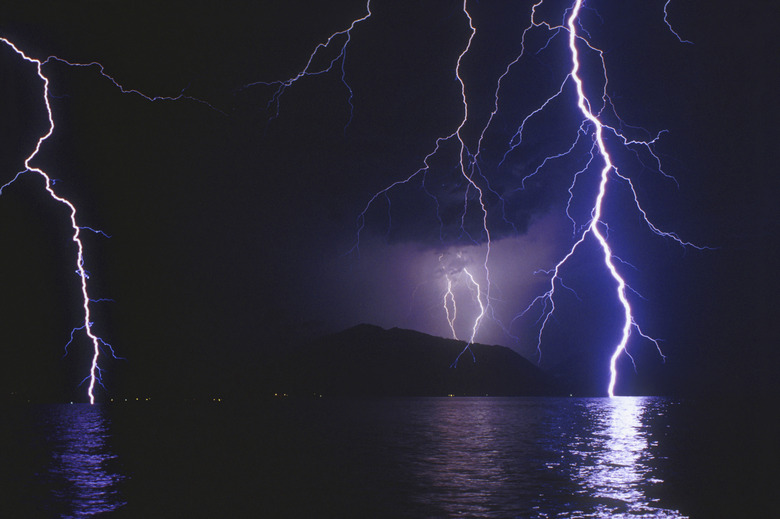Why Do Ionic Compounds Conduct Electricity In Water?
Salt water is the most well-known example of an ionic solution that conducts electricity, but understanding why this happens isn't as simple as performing a home experiment on the phenomenon. The reason comes down to the difference between ionic bonds and covalent bonds, as well as understanding what happens when dissociated ions are subjected to an electric field.
In short, ionic compounds conduct electricity in water because they separate into charged ions, which are then attracted to the oppositely charged electrode.
An Ionic Bond vs. A Covalent Bond
An Ionic Bond vs. A Covalent Bond
You need to know the difference between ionic and covalent bonds to get a better understanding of the electrical conductivity of ionic compounds.
**Covalent bonds** are formed when atoms share electrons to complete their outer (valence) shells. For example, elemental hydrogen has one "space" in its outer electron shell, so it can bond covalently with another hydrogen atom, with both sharing their electrons to fill their shells.
An **ionic bond** works differently. Some atoms, like sodium, have one or very few electrons in their outer shells. Other atoms, like chlorine, have outer shells that just need one more electron to have a full shell. The extra electron in that first atom can transfer to the second to fill that other shell.
However, the processes of losing and gaining elections create an imbalance between the charge in the nucleus and the charge from the electrons, giving the resultant atom a net positive charge (when an electron is lost) or a net negative charge (when one is gained). These charged atoms are called ions, and oppositely charged ions can be attracted together to form an ionic bond and an electrically neutral molecule, such as NaCl, or sodium chloride.
Note how "chlorine" changes to "chloride" when it becomes an ion.
Dissociation of Ionic Bonds
Dissociation of Ionic Bonds
The ionic bonds that keep molecules like common salt (sodium chloride) together can be broken apart in some circumstances. One example is when they're dissolved in water; the molecules "dissociate" into their constituent ions, which returns them to their charged state.
The ionic bonds can also be broken if the molecules are melted under high temperature, which has the same effect when they remain in a molten state.
The fact that either of these processes leads to a collection of charged ions is central to the electrical conductivity of ionic compounds. In their bonded, solid states, molecules like salt don't conduct electricity. But when they're dissociated in a solution or through melting, they can carry a current. This is because electrons can't move freely through water (in the same way they do in a conductive wire), but ions can move freely.
When a Current Is Applied
When a Current Is Applied
To apply a current to a solution, two electrodes are inserted into the liquid, both attached to a battery or source of charge. The positively charged electrode is called the anode, and the negatively charged electrode is called the cathode. The battery sends charge to the electrodes (in the more traditional way involving electrons moving through a solid conductive material), and they become distinct sources of charge in the liquid, producing an electric field.
The ions in the solution respond to this electric field according to their charge. The positively charged ions (sodium in a salt solution) are attracted to the cathode and the negatively charged ions (chloride ions in a salt solution) are attracted to the anode. This movement of charged particles is an electric current, because current is simply the movement of charge.
When the ions reach their respective electrodes, they either gain or lose electrons to revert to their elemental state. For dissociated salt, the positively charged sodium ions congregate at the cathode and pick up electrons from the electrode, leaving it as elemental sodium.
At the same time, the chloride ions lose their "extra" electron at the anode, sending electrons into the electrode to complete the circuit. This process is why ionic compounds conduct electricity in water.
References
- Purdue University: Electrolytic Cells
- BBC GCSE Bitesize: Electrolysis
- Siyavula: Electrolytes, Ionisation and Conductivity
- Master Concepts in Chemistry: Why Does Salt Solution Conduct Electricity, While Sugar Solution Doesn't?
- Chemistry LibreTexts: Physical Properties of Ionic Compounds
- Lumen: The Covalent Bond
Cite This Article
MLA
Johnson, Lee. "Why Do Ionic Compounds Conduct Electricity In Water?" sciencing.com, https://www.sciencing.com/do-compounds-conduct-electricity-water-6681297/. 25 March 2019.
APA
Johnson, Lee. (2019, March 25). Why Do Ionic Compounds Conduct Electricity In Water?. sciencing.com. Retrieved from https://www.sciencing.com/do-compounds-conduct-electricity-water-6681297/
Chicago
Johnson, Lee. Why Do Ionic Compounds Conduct Electricity In Water? last modified March 24, 2022. https://www.sciencing.com/do-compounds-conduct-electricity-water-6681297/
